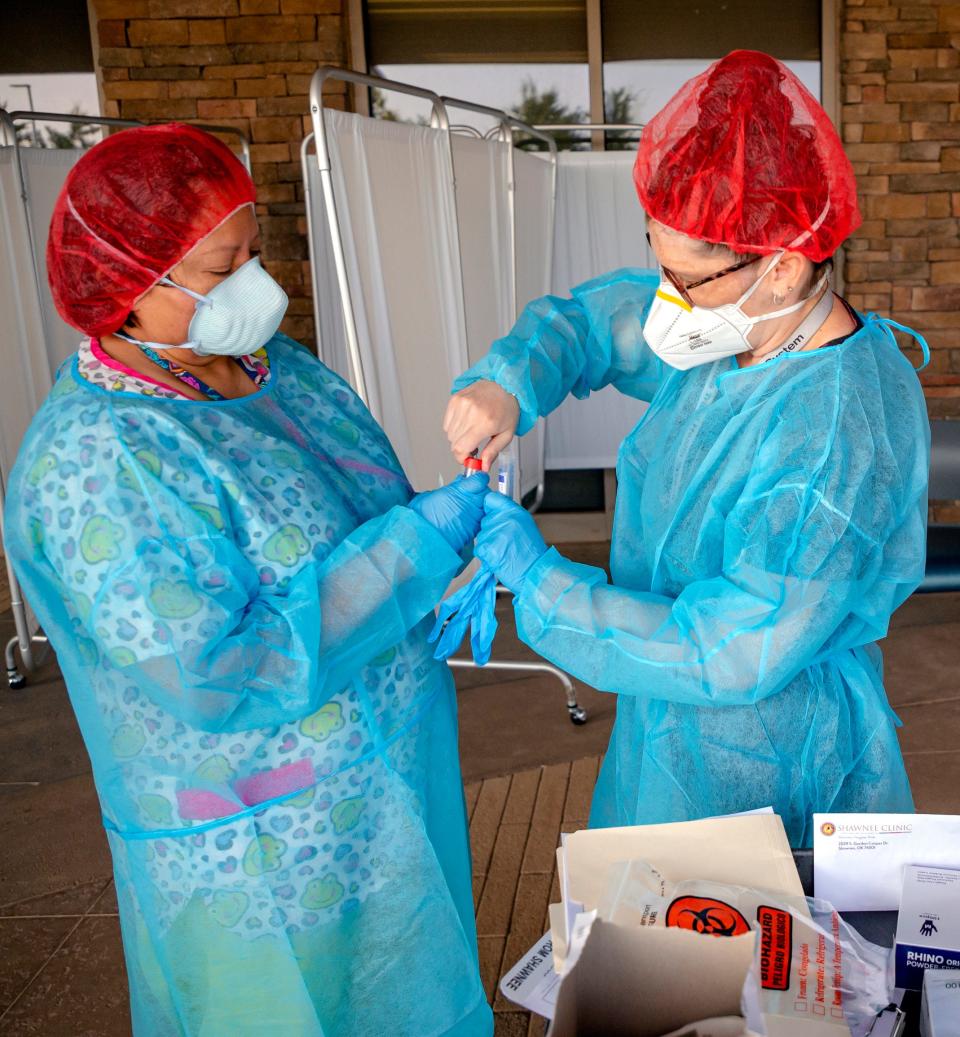Business shutdowns, governmental delays: Omicron surges hit Oklahoma's tribal nations hard
The rapid spread of COVID-19 carried by the omicron variant has forced some Oklahoma tribal governments to delay services, cut hours and cancel events.
Staffing shortages have been so severe that at least six tribal nations have shut down their government offices for three days or more. Four more have closed buildings to visitors. At least two have cut back on direct health care services for citizens and employees.
The Sac and Fox Nation in Stroud will close all but the pharmacy at its Black Hawk Health Center for one week, starting Monday. It also will close its government building to all but essential services.
Principal Chief Justin Wood said he and other leaders made the decision as they tried to balance the increasing number of coronavirus cases among employees with the need to provide services to citizens.
Wood hopes the one-week “catch up” will allow employees to recover and avoid COVID-19 as it spreads quickly across Oklahoma. “It’s difficult to do,” he said.
Latest news: Oklahoma COVID tracker
Hitting tribes hard
The state recorded a new daily high of 11,315 coronavirus cases on Friday, a number that has been trending up since mid-December. The case total for January is on track to become the highest of any month since the pandemic began. Hospitalizations and deaths are also on the rise. COVID-19 has killed at least 12,775 people in Oklahoma, roughly equal to the entire population of Miami in the northeast corner of the state.
Earlier waves of the coronavirus pandemic hit Native American communities especially hard. The latest surge is no different, said Rear Admiral Travis Watts, who leads the Oklahoma City area of the Indian Health Service. The region covers all clinics run by the IHS and tribes in Oklahoma and Kansas, as well as one in Texas.
Those clinics have reported the largest spike in coronavirus cases among all regions tracked by the Indian Health Service. About 13,600 patients have tested positive since Jan. 1.
The region’s one-week positivity rate of 34% is also the highest in the U.S. The rate is expected to climb to 40%, Watts told Cherokee, Chickasaw, Choctaw, Muscogee and Seminole leaders gathered Friday for their quarterly inter-tribal council meeting.
Governmental shutdowns
Watts, who is Choctaw, said epidemiology data indicates infections may peak over the next week, meaning hospitals will continue to see a surge for the next few weeks. Tribal and IHS clinics are administering COVID-19 tests at record levels and expect to test as many as 30,000 people over the next week.
More: Pediatric hospital admissions for COVID-19 on the rise in Oklahoma, doctors say
The Osage Nation in northern Oklahoma tested 405 employees at its tribal clinic on Monday and Tuesday last week and 57 of those tests came back positive, the tribe said in a statement.
In southwest Oklahoma, the Kiowa Tribe became the first to announce Dec. 29 that it planned to close government offices for two weeks to try to stem the spread.
The nearby Apache Tribe shifted employees to half days due to staffing shortages. Another Caddo County tribe, the Delaware Nation, announced Tuesday that it would close its offices for at least three days. Delaware leaders also temporarily shut down one of the tribe’s casinos.
The neighboring Wichita and Affiliated tribes also moved on Tuesday to close their government offices for one week, citing the illnesses of 30 employees.
Across the state in eastern Oklahoma, the Muscogee Nation returned to stricter coronavirus protocols to try to stop the virus from spreading, said spokesman Jason Salsman. Masks are required at all times in government buildings, and lobbies are closed to visitors.

Healthcare in jeopardy
Staffing shortages are also cutting into tribes’ ability to provide the same level of health care.
The Absentee Shawnee tribe said Friday that it will temporarily close its walk-in clinic in Shawnee and consolidate those services at another clinic in Norman.
In Oklahoma, tribal clinics have played a central role during the pandemic, and were among the first health care providers to make vaccines widely available to the general public.
"I can’t emphasize enough that the vaccine continues to be our most important therapeutic tool against COVID," Watts said.
Still, nearly half of Oklahomans who are eligible to get the vaccine haven’t received the shot. The state’s vaccination rate, at 54.1%, is 12th-lowest in the U.S. and well below the national mark of 62.7%.
More: Unvaccinated 3x more likely to die of COVID-19, Oklahoma study finds
On Thursday, the Supreme Court struck down President Joe Biden’s mandate through OSHA that large private employers require workers to become vaccinated or face frequent testing.
Some tribes, as sovereign governments, have enforced their own requirements. At least two in Oklahoma, the Cheyenne and Arapaho and Citizen Potawatomi, rolled out widespread vaccine mandates among employees. The Cherokee and Chickasaw required certain workers to receive the shot, such as those working in health care.
The Sac and Fox Nation does not have a vaccination requirement for employees, but more than 90% of employees are vaccinated, Wood said.
Yet after the holidays, coronavirus cases among employees started to tick up. Last week, more than 10% of employees were out, Wood said. Some parents also had to navigate school closures.
“A few departments were so low on staff that it didn’t make sense to continue operating,” Wood said.
Although the administration offices will be closed starting Monday, essential functions, such as processing paychecks, will continue. The tribe’s governing body also plans to meet.
Wood said he’s confident all operations will resume Jan. 24.
Molly Young covers Indigenous affairs for the USA Today Network's Sunbelt Region of Colorado, Oklahoma, New Mexico and Texas. Reach her at mollyyoung@gannett.com or 405-347-3534.
This article originally appeared on Oklahoman: Shutdowns, cutbacks: Oklahoma tribal nations respond to COVID surge
